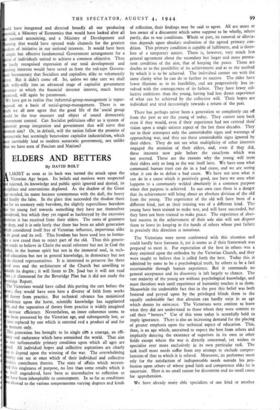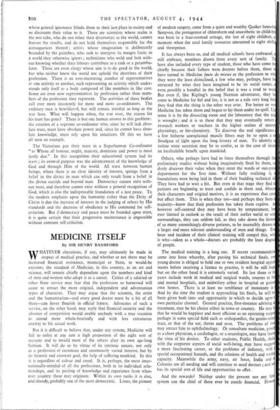ELDERS AND BETTERS
By DAVID ROLT LMOST as soon as its back was turned the attack upon the Victorian Age began. Its beliefs and motives were suspected d rejected, its knowledge and public spirit ignored and denied, its sciplines and conventions deplored. As the shadow of the Great receded, its name became synonymous with the dull, the heavy finally the false. In the glare that succeeded the shadow there s for its memory only boredom, the slightly supercilious boredom at the young feel towards something they have not themselves nsidered, but which they yet regard as hackneyed by the excessive ention it has received from their elders. The roots of greatness
e deep, and it is only lately that there has been an adult generation 'di considered itself free of Victorian influence, impervious alike its good and its evil. This freedom has been used less to formu- e a new creed than to reject part of the old. Thus this genera- n tends to believe in Christ the social reformer but not in God the Cher, in the human spirit but not in the immortal soul, in tech- al education but not in general knowledge, in democracy but not us elected representatives. It is interested to preserve the three al uses and the architecture of the Church but unwilling to cede its dogma ; it will listen to Dr. Joad but it will not read ato ; it clamoured for the Beveridge Plan but it did not study the veridge Report.
The Victorians would have called this putting the cart before the se ; they would have seen here a divorce of faith from works d theory from practice. But technical advance has minimised pendence upon the horse, scientific knowledge has supplanted th, and the separation of theory from practice is widely imagined increase efficiency. Nevertheless, an inner coherence seems to 'e been possessed by the Victorian age, and subsequently lost, or least replaced by one which is external and a product of and for e moment only.
This generation has brought to its single aim a courage, an effi- ncy and endurance which have astonished the world. That aim one indispensable primary condition upon which all ages are reed. All individual hopes and collective aspirations are clearly to depend upon the winning of the war. The overwhelming wily can see at once which of their individual and collective wities contributes thereto. The state of affairs which necessi- ed this singleness of purpose, no less than some results which it s itself engendered, have been as tinconducive to reflection as have been inhospitable to contentment. In so far as conditions ve 31lowed to the various temperaments varying degrees and kinds
• of reflection, their findings may be said to agree. All are more or less aware of a discontent which some suppose to be wholly, others partly, due to war conditions. Whole or part, its removal or allevia- tion depends upon absolute realisation of the agreed primary con- dition. This primary condition is capable of fulfilment, and is there- fore of a temporary nature. There is, however, very much less general agreement about the secondary but larger and more perma- nent condition of the aim, that of keeping the peace. There are doubts as to the possibility of its achievement and as to the method by which it is to be achieved. The individual cannot see with the same clarity what he can do to further its success The older have fewer illusions as to its feasibility, and are progressively less in- volved with the consequ.inces of its failure. They have fewer col- lective ambitions than the young, having had less direct experience of what can be achieved by the collective will. Their hopes are individual and tend increasingly towards a return of the past.
There has perhaps never been a generation so completely cut off from the past as are the young of today. They cannot turn back even if they would, even if their experience had not centred their vision upon a single sinister aspect of the last three decades. They see in their retrospect only the unmistakable signs and warnings of approaching war, and they see these unmistakable signs ignored by their elders. They do not see what multiplicity of other interests engaged the attention of their elders, and, even if they did, these interests now pale before the cataclysm which was not averted. These are the reasons why the young will trust their elders only so long as the war itself lasts. We have seen what communal human trust can do in a bad cause, and we are seeing what it can do to defeat a bad cause. We have not seen what it can do in a cause which is positively good, nor have we seen what happens to a community welded absolutely in a common purpose when that purpose is achieved. In our own case there is a danger that its achievement will bring about an absolute division of the old from the young. The experience of the old will have been of a different kind, just as their training was of a different kind. The young have been trained to make war, and will have succeeded, but they have not been trained to make peace. The experience of abso- lute success in the achievement of their sole aim will not dispose them to leave its keeping in the hands of others whose past failure in precisely this direction is notorious.
The Victorians were never confronted with this situation and could hardly have foreseen it, yet it seems as if their framework was prepared to meet it. For expectation of the best in others was a duty enjoined upon the orthodox by the Victorian Church, and they were taught to believe that it called forth the best. Today this is admitted by some to be a psychological truth, by others to be a fact ascertainable through human experience. But it commands no general acceptance and its discovery is left largely to chance. The vast majority of the young arc without psychological knowledge, and must therefore wait until experience of humanity teaches it to them. Meanwhile the undeniable fact that in the past this belief was both fostered and preyed upon by the privileged blinds them to the equally undeniable fact that altruism can hardly exist in an age which denies its existence. The Victorians were content to leave what they did not understand to those whom they were content to call their "betters." Use of this term today is scornfully held to imply ignorance. There is also an increasing demand for the placing of greater emphasis upon the technical aspect of education. This, then, is an age which, untrained to expect the best from others and implicitly denying the existence of superiors in its own or other fields except where the war is directly concerned, yet wishes to specialise ever more exclusively in its own particular task. The task itself must needs suffer from any attempt to exclude compre- hension of that to which it is related. Moreover, its performer must rely for the satisfaction of indispensable needs outside his pro- fession upon others of whose good faith and competence alike he is uncertain. Here is no small reason for discontent and no small cause for apprehension.
We have already many able specialists of one kind or another
whose general ignorance blinds them to their just place in society and so discounts their value to it. There are scientists whose realm is the test tube, who do not relate their discoveries to the world, cannot foresee the results, and do not hold themselves responsible for the consequences thereof ; artists whose imagination is deliberately bounded by the paintbox, who seek to interpret its meagre fruits to A world they otherwise ignore ; technicians who weld and bolt with- out knowing whether their labours contribute to a tank or a perambu- lator. There are even clergy whose aim is to do good in the world, but who neither know the world nor uphold the doctrines of their profession. There is an ever-increasing number of representatives o! one activity or another, each representing an activity which under- stands only itself to a body composed of like members in like case. Some are even now representatives by profession rather than mem- bers of the profession they represent. The activities of these bodies call ever more insistently for more and more co-ordinators. The ordinary man is bewildered, but-will remain trustful so long as the war lasts. What will happen when, the war over, the. reason for - his trust has gone? There is but one human answer to this problem : the creation of a supreme co-ordinator who, since he will lack abso- lute trust, must have absolute power and, since he cannot have abso- lute knowledge, must rely upon his intuitions. Of this we have all seen an example.
The Victorians put their trust in a Superhuman Co-ordinator " to Whom all honour, might, majesty, dominion and power is most justly due." In this recognition their educational system had its roots ; its avowed purpose was the advancement of the knowledge of God and through Him of the world. All trust between human beings, where there is no clear identity of interest, springs from a belief in the divine in man which can only result from a belief in the divine outside and beyond man. Democracy cannot exist with- out trust, and therefore cannot exist without a general recognition of God, which is also the indispensable foundation of a just peace. To the modern emphasis upon the humanity rather than the Deity of Christ is due the increase of interest in the judging of others by His standards and the decrease of obedience to His command for self- criticism. But if democracy and peace must be founded upon trust, it is quite certain that their progressive maintenance is impossible without constant self-criticism.



























 Previous page
Previous page